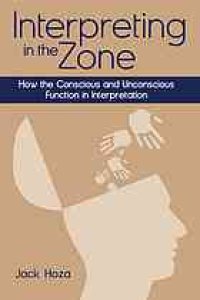"Successful interpretation can feelseamless, an intuitiveand efficient translation of meaning from one signed or spoken languageto another. Yet the process of interpretation is actually quite complex and relies upon myriad components ranging from preparation to experience to honed judgment. Interpreting in the zone, instinctively and confidently, is an energizing, encompassing experience that results in great
satisfaction and top performance--but what does it take to get there? Jack Hoza's newest research examines the components that enable interpreters to perform successfully, looking at literature in interpretation, cognitive science, education, psychology, and neuroscience, as well as reviewing the results of two qualitative studies he conducted. He seeks to uncover what it means to interpret in the zone by understanding exactly how the brain works in interpretation scenarios. He explores a range of dichotomies that influence interpretation outcomes, such as: Intuition vs. rational thought Left brain vs. right brain Explicit vs. implicit learning Novice vs. master Spoken vs. signed languages Emotion vs. reasoning Cognitive processes such as perception, short-term memory, and reflexivity are strong factors in driving successful interpretation and are explored along with habits, behaviors, and learned strategies that can help or hinder interpretation skills. Hoza also considers the importance of professional development and collaboration with other practitioners in order to continually hone expertise. Interpreting in the Zone shows that cognitive research can help us better understand the intricacies of the interpreting process and has implications for how to approach the interpreting task. This resource will be of value to both the interpreter-in-training as well as the seasoned practitioner"--"Research examines the components that enable interpreters to perform successfully"--
Read more... 